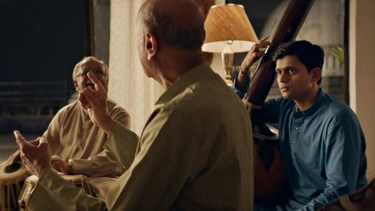
The Disciple is playing at the Paris Theater from June 7-13, 2021, and is available to stream on Netflix.
Chaitanya Tamhane’s follow up to the critically acclaimed Court, the subtly layered, precisely composed The Disciple is an implosive existential crisis in the face of personal failure that reflects larger questions about art, capitalism, and spiritual devotion in a constantly evolving world. Its titular character Sharad (Aditya Modak) is a trained vocalist in one of the most notoriously challenging arts - Northern Indian classical music - who finds himself lagging behind in his career, experiencing one minor humiliation after another, despite his demonstrable, near-ascetic dedication to both guru and art form. The film begins in a moment when Sharad’s unwavering resolve is just beginning to crumble.
Watching the film via its 2020 New York Film Festival premiere brought back my own experiences of learning Hindustani classical music while growing up in New Delhi, just a decade before the film’s events begin in 2006 (it goes on to take a leap forward in time). Even when I was thirteen my adorably mustachioed guru, whom I called Uncle, barely grazed the top of my nose. Yet he had a singular command over my life in and out of his presence; his tales of the great lineage of the raga, of how dedication was the only path he had ever known, was the reason I, otherwise a patience-trying rebellious teenager, never smoked cigarettes (I believed he would hear the tell-tale rasp of even one puff), drank neither hot chai nor ice water despite the 110 degree dry summer heat (everything had to be lukewarm, always). Even then I could sense a kind of melancholy vibration around how wider recognition and success eluded him, and this suspicion was forcefully brought back to me by the beautifully restrained performance from Modak, and Tamhane’s profound engagement with the world I had been part of in a formative time in my life.
So many details in this film resonated, from the name dropping of their guru line, to the conversations in well appointed concert halls. In that way, the depiction of a personal crisis within an artistic and professional ecosystem, a scene, with its stars, fans, teachers, detractors, and critics, was reminiscent of the Coen Brothers’ Inside Llewyn Davis. However The Disciple is not an artifact of another era; it is an affectionate but skewering look at a character unable or unwilling to adapt to globalization and the internet age.
From the outside, it is easy to see ancient art forms as frozen in time, particularly from a Western perspective prone to colonial notions of an India where whitefolk go to find themselves, but this is of course a fallacy. As many reviewers have noted, the film will not hand-hold the uninitiated through its pitch-perfect detailing of a specific art form with specific rules that are in the process of bending, much to the chagrin of the film’s protagonist. Even in a field like Hindustani where a connection to tradition stays strong, the music itself, the way it may be sung, the audience who hear it, and how it reaches them, changes, and for Sharad, that is to be grieved. There is a quiet subversion in the film’s unwillingness to rush or sensationalize, to choose in the false binary of the old world or the new; there are no easy solutions to Sharad’s dilemma, only imperfect outcomes reached through sitting with profound discomfort until forced into concessions through the accumulation of a thousand tiny paper cuts
Larger than the titular character’s personal existential crisis, however, or even the world of the music industry in India, is the investigation of taste and elitism, of what an artist owes the teachings that first sparked their passion. Sharad’s character is sympathetic for any art lover, the film’s maker clearly included, yet begs to be shaken out of a rigidity that somehow takes him further from being able to share his love of music with the outside world. His borderline disdain for populist taste is amusing and understandable but masks a deeper insecurity that does not serve him. Like Let’s Talk About Love: A Journey to the End of Taste, Carl Wilson’s surprising investigation of Celine Dion’s enduring global popularity under the 33-1/3 imprint, Tamhane questions the value of holding oneself apart from society for the sake of art. Surely it is a shame to lose the old ways, but what has such purity of practice ultimately done for Sharad, slowly becoming embittered watching his peers and even students make it on reality tv shows while he tends to his guru’s health and reads crushingly scant comments on his YouTube posts?
The film explicitly engages with a nostalgia for a traditional art in its purest form yet is utterly of its time and place. In the modern cultural landscape of an India just before a new wave of Hindu nationalism gained the foothold it maintains now, before a pandemic with devastating consequences for this nation in particular, one spike continuing to ravage the country at this very moment, Tamhane gentle film’s meditation about the place of old values in a new world, about what commerce hath wrought, about the survival of art and the people who make it, finds unexpected purchase far beyond the music room.
Farihah Zaman is a Bangladeshi-American filmmaker, critic, and curator.
